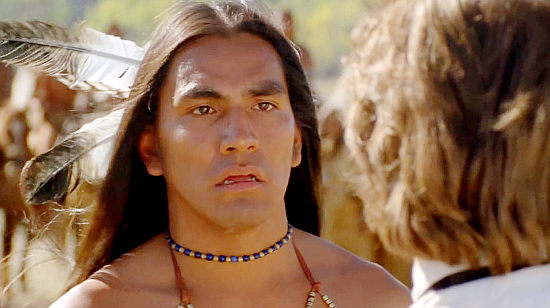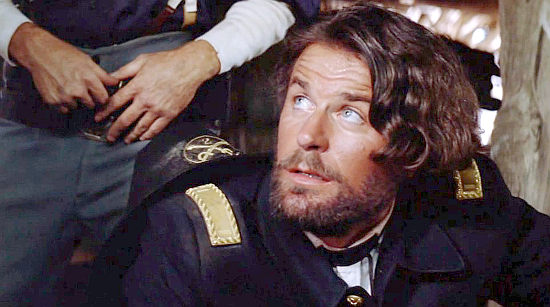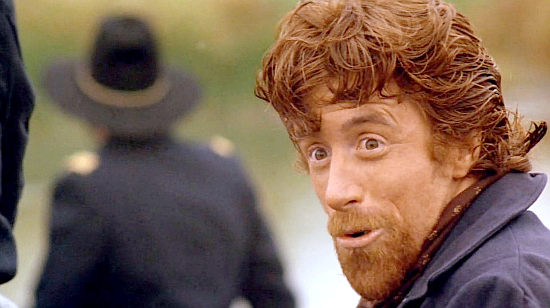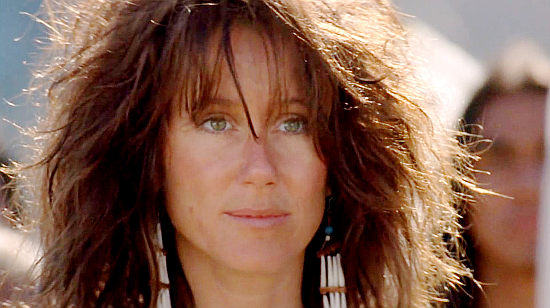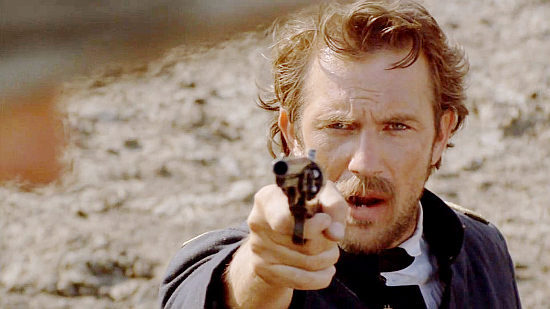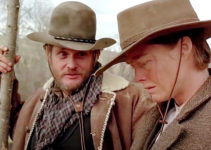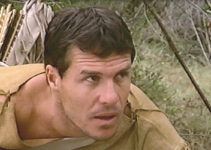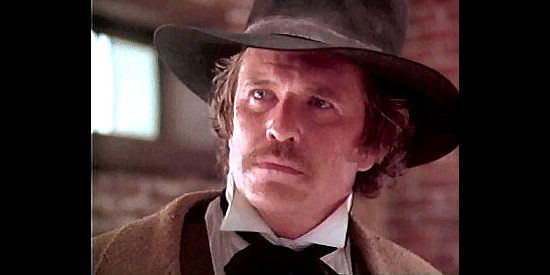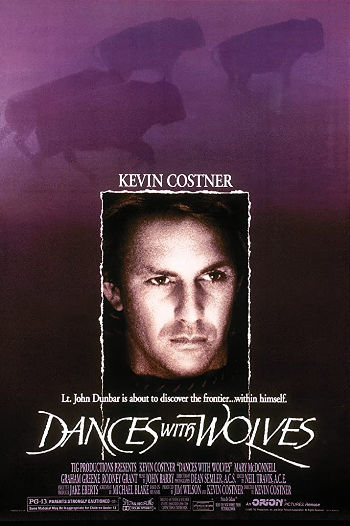 Kevin Costner is John Dunbar, a Union officer wounded and about to have his foot amputated in a battle at St. David’s Field in Tennessee.
Kevin Costner is John Dunbar, a Union officer wounded and about to have his foot amputated in a battle at St. David’s Field in Tennessee.
Instead, he climbs off the operating table, pulls his boot back on and mounts a horse name Cisco. Then he rides Cisco between the lines, welcoming death.
He isn’t hit by a single bullet. Nor is Cisco. And his heroism spurs a Union charge that becomes a Union victory.
As a reward for that heroism, he’s promoted to lieutenant and given his choice of posts. His choice: Head West to see the frontier before it’s gone.
He winds up assigned to the deserted Fort Sedgwick, a pair of shacks situated near a pond. At first, his only companionship is Cisco and a wolf he names Two Socks.
But that soon changes. The Sioux camped nearby are curious about the white in their midst and worried more will follow. Dundar’s determined to get to know them as well.
That’s difficult until Sioux holy man Kicking Bird (Graham Greene) gets his adopted daughter Stands With a Fist (Mary McDonnell) involved. She was a white captive as a child and still remembers a bit of English.
Eventually, Costner is adopted by the tribe, given a lodge and given an Indian name. He befriends Kicking Bird, the fierce Wind in His Hair (Rodney A. Grant) and Chief Ten Bears (Floyd “Red Crow” Westerman). He marries Stands With a Fist.
But there’s one Sioux question Dunbar hesitates to answer: Will more white men follow?
He knows the answer. He also knows the answer is likely to threaten the people he’s grown to love.
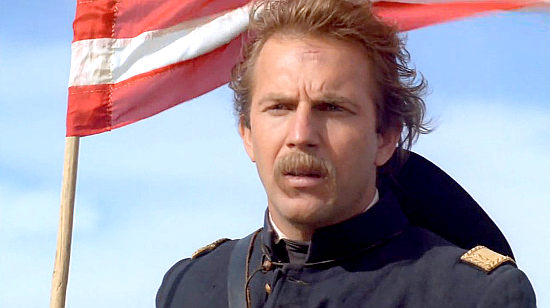
Kevin Costner as Lt. John Dunbar, riding out to meet the Sioux and finding a surprise in Dances with Wolves (1990)
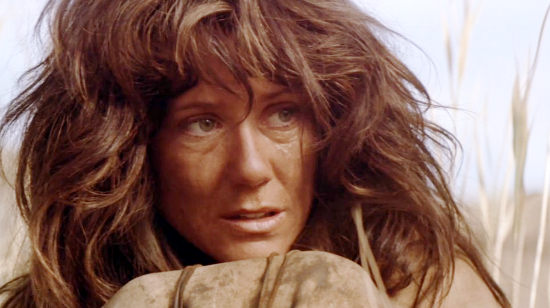
Mary McDonnell as Stands with a Fist, remembering back to her capture by the Sioux in Dances with Wolves (1990)
A marvelous looking film that marked Costner’s directorial debut, became a major hit and wound up winning a Best Picture Oscar, the first for a Western since “Cimarron” in 1931.
The action sequences — from the opening Civil War battle to the bison hunt to the Pawnee attack on the Sioux village — are captivating.
But what makes the film such a success is the slow build of Dunbar’s relationship and growing admiration for the Sioux way of life. Yes, in answer to a soldier’s question, he turns “Indian.”
The film’s flaw is the heavy-handedness of the message. The Sioux village is portrayed as utopia. Every white who shows up on screen after Dunbar heads West is despicable, from the officer who pisses his pants as he sends Dunbar off to Fort Sedgwick, to the foul, farting supply wagon driver who takes him there to the soldiers who later use his journal as toilet paper.
Every white except Dunbar, of course, who becomes something of a hero to the Indians too by being the first to spot the buffalo herd, saving a young Sioux boy from a charging bison and leading the Sioux in their victory over the Pawnee.
Some trivia: The young girl shown fleeing Indians in Mary McDonnell’s flashback to when she was captured is Costner’s daughter Annie at age 6. The buffalo liver Wind in His Hair and Dunbar eat was made of cranberry jello. And the charging buffalo that nearly kills Smiles a Lot was charging his favorite treat: Oreo cookies.
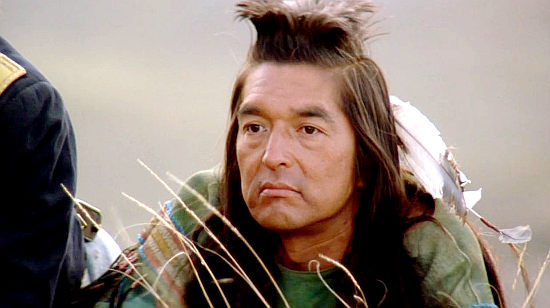
Graham Greene as Kicking Bird, side by side with Dunbar in a buffalo hunt in Dances with Wolves (1990)
Directed by:
Kevin Costner
Cast:
Kevin Costner … Lt. John Dunbar
Mary McDonnell … Stands With a Fist
Graham Greene … Kicking Bird
Rodney A. Grant … Wind in His Hair
Floyd “Red Crow” Westerman … Ten Bears
Tantoo Cardinal … Black Shawl
Robert Pastorelli … Timmons
Charles Rocket … Lt. Elgin
Maury Chaykin … Maj. Fambrough
Jimmy Herrman … Stone Calf
Nathan Lee Chasing His Horse … Smiles a Lot
Michael Spears … Otter
Jason R. Lone Hill … Worm
Tony Pierce … Spivey
Doris Leader Charge … Pretty Shield
Runtime: 181 min.
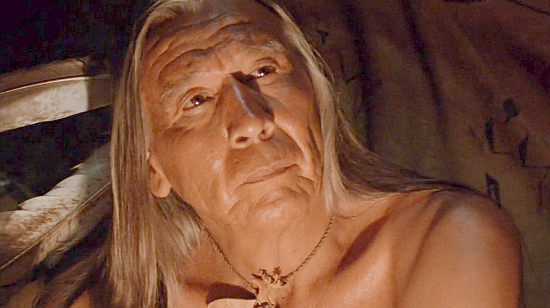
Floyd Westerman as Ten Bears, a Sioux chief who advises meeting with Dunbar in Dances with Wolves (1990)
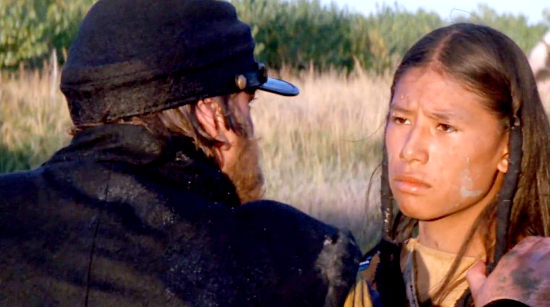
Nathan Lee Chasing His Horse as Smiles a Lot, coming face to face with a cavalryman in Dances with Wolves (1990)
Memorable lines:
John Dunbar: “The strangeness of this life cannot be measured. In trying to produce my own death, I was elevated to the status of a living hero.”
Major Fambrough: “Sir knight? I’ve just pissed in my pants… and nobody can do anything about it.”
Timmons, the wagon driver, as he and Dunbar come across a skeleton: “Somebody back East saying, ‘Why don’t he write?'”
Pretty Shield: “Will she make the white words?”
Kicking Bird: “She won’t try. She is being difficult.”
Pretty Shield: “Well, she’s the one who is crying. Perhaps the difficulty is yours.”
Lt. Dunbar: “Nothing I’ve been told about these people is correct. They are not beggars and thieves. They are not the boogy-men they’ve been made out to be.”
John Dunbar: “I had never really known who John Dunbar was. Perhaps because the name itself had no meaning. But as I heard my Sioux name being called over and over, I knew for the first time who I really was.”
John Dunbar: “It was hard to know how to feel. I had never been in a battle like this one. This had not been a fight for territory or riches or to make men free. This battle had no ego. It had been fought to preserve the food stores that would see us through winter, to protect the lives of women and children and loved ones only a few feet away. I felt a pride I had never felt before.”
Sgt. Bowers, a guard to Dunbar: “Turned Injun, didn’t you? Didn’t you?”
John Dunbar, in Lakota to his army captors: “My name is Dances with Wolves. I have nothing to say to you. You are not worth talking to.”
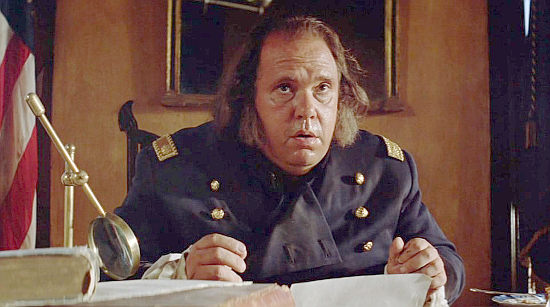
Maury Chaykin as Maj. Fambrough, about to send Dunbar to a deserted post in Dances with Wolves (1990)
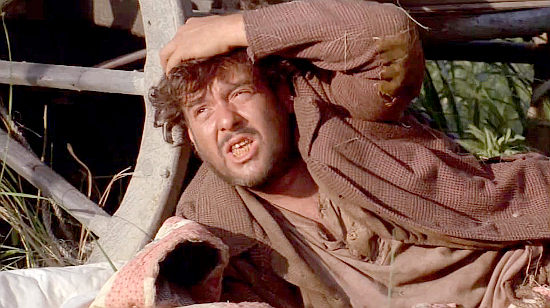
Robert Pastorelli as Timmons, the freighter who takes Dunbar to his new post in Dances with Wolves (1990)
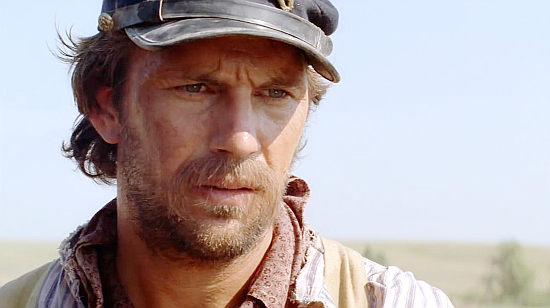
Kevin Costner as Lt. John Dunbar, witnessing the mess those before him left behind in Dances with Wolves (1990)
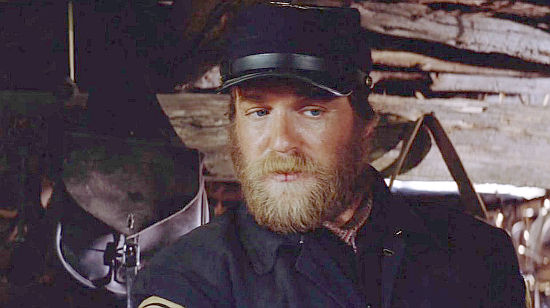
Larry Joshua as Sgt. Bauer, one of the cavalryman Dunbar finds upon his return to his post in Dances with Wolves (1990)
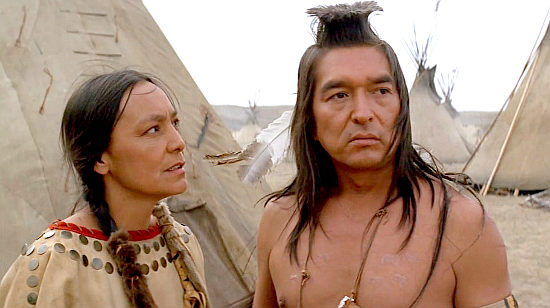
Tantoo Cardinal as Black Shawl, questioning Kicking Bird’s approach with Stands with a Fist in Dances with Wolves (1990)
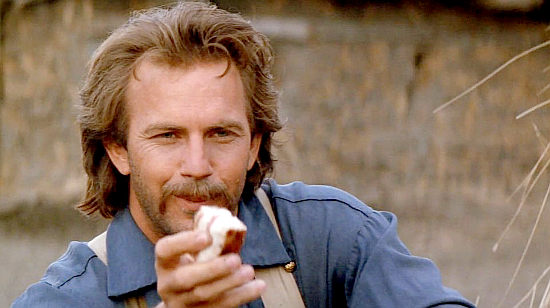
Kevin Costner as Lt. John Dunbar, trying to win the confidence of a wolf named Two Socks in Dances with Wolves (1990)

